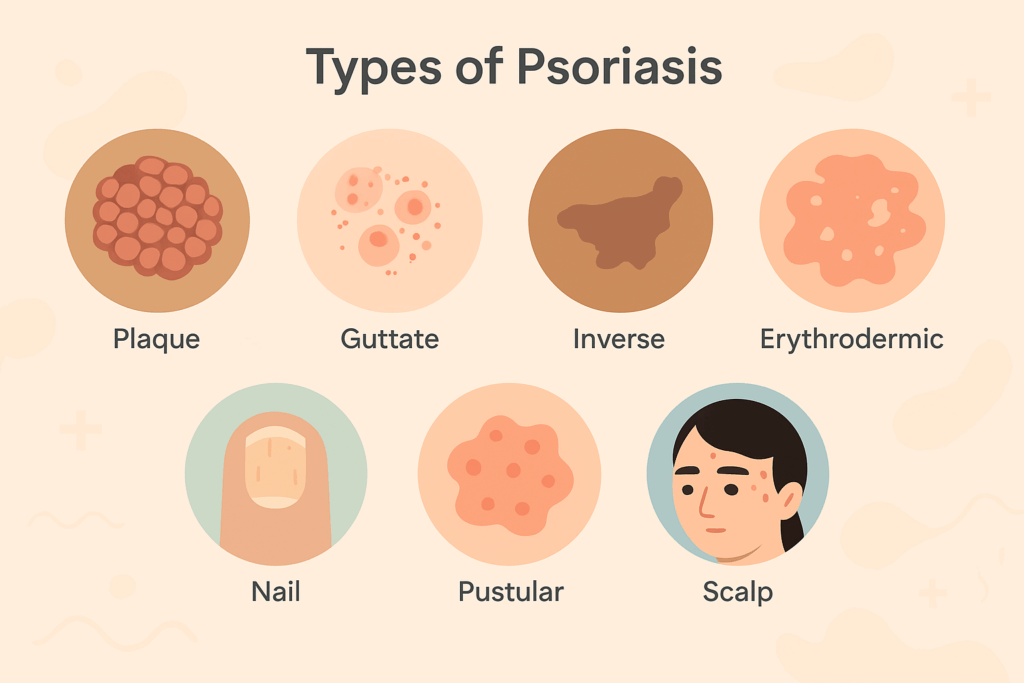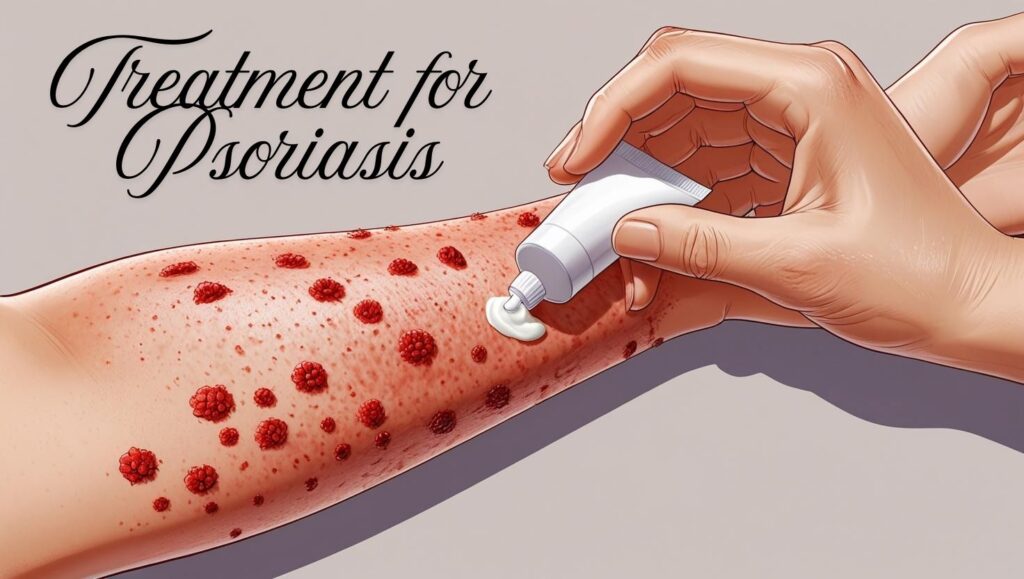Psoriasis treatment is needed if you notice red, scaly patches on your skin, constant itching, or dry, cracked skin that sometimes bleeds, don’t take it lightly. These may be the symptoms of psoriasis, a chronic skin condition that can get worse if ignored. Psoriasis happens when the body’s immune system speeds up the skin cell cycle, causing cells to build up and form patches. But you don’t have to worry unnecessarily. With the right care and treatment, psoriasis can be controlled and its symptoms greatly reduced.
Types of Psoriasis:
Psoriasis can look different from person to person. Here are the main types you should know about:
Plaque : The most common type, causing raised, inflamed patches covered with silvery-white scales.
Inverse : Appears in skin folds such as under the breasts, around the groin, or near the buttocks, showing smooth red lesions.
Guttate : Often triggered after throat infections, with small, red, drop-shaped spots on the skin.
Pustular : Marked by white pustules (non-infectious blisters filled with pus) surrounded by red skin.
Erythrodermic : A rare and severe form that causes widespread redness, shedding of skin, and intense discomfort.
Nail : Affects nails, leading to pitting, thickening, and discoloration of fingernails or toenails.
Sebo: A condition that shows features of both psoriasis and seborrheic dermatitis, mostly on the scalp and face.

Psoriasis Treatment Options
There isn’t a one-size-fits-all cure , but the right treatment can help control flare-ups and improve skin health. Doctors usually suggest treatments depending on how severe the condition is and which areas of the body are affected. Common treatment options include:
Topical Treatments: Creams, ointments, and medicated shampoos that reduce inflammation, itching, and scaling.
Phototherapy (Light Therapy): Controlled exposure to ultraviolet light to slow down skin cell growth.
Oral and Injectable Medications: Prescribed for moderate to severe cases to reduce immune system overactivity.
Lifestyle Changes: Stress management, a healthy diet, and proper skincare routines that minimize triggers.
While these methods can help, many people look for gentler, holistic approaches with fewer side effects. This is where Ayurveda comes into the picture.
Why Ayurvedic Treatment for Psoriasis?
Ayurveda focuses on balancing the body from within instead of just treating symptoms on the surface. Treatment usually combines herbal remedies, detox therapies, dietary adjustments, and stress management.
Benefits of Ayurvedic treatment include:
Natural herbs that soothe inflammation and dryness
Long-term relief without harsh chemicals
Focus on root causes, not just visible patches
Safer for sensitive skin compared to steroids or heavy medications
This makes Ayurveda a promising option for those seeking a more natural, side-effect-free way of managing psoriasis.
Among Ayurvedic remedies, specially formulated herbal creams have gained attention for their effectiveness in reducing redness, itchiness, and scaling. These creams usually contain ingredients like Neem, Aloe Vera, Turmeric, and Coconut Oil, which are known for their anti-inflammatory, antibacterial, and skin-healing properties.
Using such a cream regularly may not only provide soothing relief but also help restore the skin’s natural barrier over time. For many people, it becomes a gentle and reliable companion in their daily psoriasis care routine.
FAQ'S
Q1. What is the most effective treatment for psoriasis?
The most effective treatment depends on the severity of the condition. Mild cases can often be managed with creams and lifestyle changes, while moderate to severe cases may require phototherapy or prescribed medicines. Many people also choose Ayurvedic remedies for long-term, side-effect-free management.
Q2. Can Ayurveda really help in psoriasis treatment?
Yes. Ayurveda focuses on balancing the body’s doshas and detoxifying the system, which helps in reducing psoriasis flare-ups. Ayurvedic treatments often include herbal remedies, dietary changes, and specially formulated creams or oils that work naturally to soothe the skin.
Q3. Is psoriasis completely curable?
Currently, there is no permanent cure. However, with proper treatment—be it modern medicine or Ayurvedic care—symptoms can be controlled, flare-ups can be reduced, and quality of life can greatly improve.
Q4. How long does Ayurvedic treatment take to show results?
Ayurvedic treatment works gradually. Most people start noticing improvements in itching, redness, and scaling within a few weeks, but for long-lasting relief, consistent use of Ayurvedic remedies and lifestyle changes are recommended.
Q5. Are Ayurvedic psoriasis creams safe to use daily?
Yes. Ayurvedic creams for psoriasis are generally made with natural herbs and oils, making them safe for daily use. They not only reduce dryness and scaling but also nourish the skin without harsh side effects.
